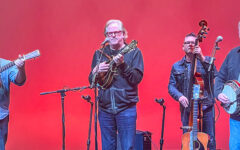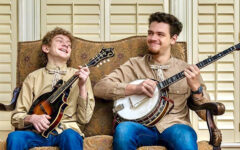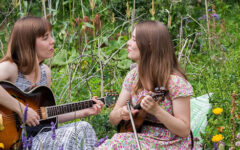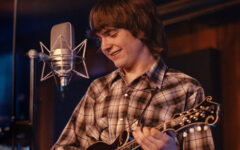
This month we welcome San Francisco Bay Area high lonesome singer, guitarist, songwriter, and activist, John McKelvy.
DB: Hi John, thanks for your time. You have a very distinctive mountain voice. Is this something you’ve always had or did it take some practice?
JM: Haha. Yes, my vocal style has been pointed out to me many times over the years but, to be honest, I’m not exactly sure where it comes from. I’ve been singing since I was a kid. I sang in the church choir and school chorus when I was little and then started singing in bands as a teenager. My family on my mom’s side were/are all from small towns in Tennessee and North Georgia. Places like Duck Town, Tennessee and Blue Ridge, Georgia. We’d visit them sometimes, driving up from north Florida, going to family reunions, etc. Many of them were pretty musical, especially singing bluegrass-style Gospel. There’s no doubt a lot of that rubbed off on me.
DB: Do you ever sing in lower registers?
JM: Yes. I definitely enjoy singing in a lower voice. Also, I often sing the lead part and jump up to the tenor during the harmonies.
DB: You’re from Florida. Was there a lot of bluegrass and old time music there when you grew up?
JM: Well, there probably was, but I wasn’t looking for it in my younger years. I was too busy being a punk rock kid. But my parents and grandparents all loved country music, so I’d hear a lot of George Jones, Loretta Lynn, Dolly Parton, Kenny Rogers and other country music around the house. Later though, after I discovered my love for bluegrass, I began to seek out bluegrass music and began going to some of the local bluegrass festivals.
DB: Tell us what bands you’re in.
JM: The Town Howlers with Michael Small, Rowan McCallister, Matt Crimp, and Jimmy Touzel. I also sometimes sit in with the Earl Brothers, although I left that band officially back in 2007. Also, some people are surprised to know that I front and sing for a rock band called Skunk. All members of Skunk are also bluegrass and old-time musicians here in the Bay Area.
DB: That’s interesting. Who’s in Skunk?
JM: I sing vocals, Dmitri Mavra and Erik Pearson play guitars, Matt Knoth is on bass and Jordan Ruyle plays drums.
DB: What other music styles do you play or follow?
JM: I’ve been part of various rock bands and even have made electronic music. I enjoy everything from rock, punk, and metal to hip hop, turntablism, electronic, blues, jazz, classical, opera, and many other styles.
DB: How did you come with the name Town Howlers?
JM: We all live in Berkeley and Oakland. Oakland is often times called “The Town” and San Francisco “The City.” Somehow the word “howlers” came up, as we often do group harmony singing, howling in our own way. Thus the name the Town Howlers came to be.
DB: Congrats on the Town Howlers album release, tell us about it.
JM: Sure, we released our first album, Alright Everybody! It’s The Town Howlers. The album contains 16 tracks of bluegrass covers and originals. We recorded the album live in the studio over four days in the summer of 2017 and finally released it this past spring. CDs, digital downloads, and stickers are available on our Bandcamp page.
DB: You’re well known from your time in the Earl Brothers. Can you talk about your experience in that band?
JM: The Earl Brothers was a unique time in my life. After the release of our album, Whiskey, Women and Death, in 2004, we began to hear from people all over the country and world who heard our music and wanted us at their festival or little town music series. The Earl Brothers could be heard daily on WDVX in Tennessee as well as on XM Radio. We began touring, and I quickly found myself on the road one to three weeks every month for the next three years. When I left the band finally in 2007, we’d just played the Winnipeg Folk Festival, and finished a three week tour of the UK. My last show was in Scotland, which I recall as a bittersweet moment.
DB: That sounds great, what happened?
JM: The million dollar question. Well, all good things must come to an end. It can be a hard life living in a little hotel room, eating bad food, and spending all of your time with the same four people all crammed into a little van. I felt it was my time to go, and so I left. I now have mainly fond memories of that time. As I mentioned before, I do still reunite every once in a while with Bobby Earl Davis and the Earl Brothers. Bobby has kept the band alive all these years in one form or another. It’s always a lot of fun to get to play with him and do those songs and then get to go sleep in my own bed.
DB: Do you have any fun shows coming up?
JM: Yes, we’ll be performing at the 3rd annual Pickin’ On Hate bluegrass benefit concert; Jan. 12th at Ashkenaz in Berkeley. The benefit will be for Trans Lifeline with a great lineup including The Town Howlers, The Country Business, Evie Ladin Band, and Fog Holler. The show starts at 7:30 p.m. with doors opening at 7:00.
DB: Back to the vocals, do you have preferences on the harmony stack in your bands?
JM: I oftentimes will leave it up to others who is singing lead versus baritone, but I pretty much will do all the tenor parts. As I mentioned before, I like to sing lead and then jump up to the tenor on the chorus when someone else takes over the lead part.
DB: What percent of your tunes are originals?
JM: I’ve written a fair amount of original tunes over the years. In the Earl Brothers, about a third of the material at that time were my originals. In the Town Howlers, we love playing songs from the bluegrass cannon, but a few of my originals have made it into our repertoire. On the new album, four of the 16 tracks are new originals I’ve written.
DB: What’s your songwriting process?
JM: I don’t really have a process. Usually, I’ll just have a hook that I like and will then work out the verses. For instance, I have a song called Got Away with Murder, which started with the line “I got away with murder and it’s killin’ me.” I thought that was an interesting line, and then fleshed out the rest of it.
DB: Do you ever co-write songs?
JM: Yes. I co-wrote one or two songs with Bobby Earl Davis in the Earl Brothers. Besides that, though, most of my songs are pretty much all my own.
DB: Do you play guitar leads, and what do you strive for in your guitar playing?
JM: I pretty much stick to the rhythm and don’t do any fancy leads. I try to maintain a hard driving rhythm. My main issue is trying not to play too loud, as my Martin D-18V is a pretty loud guitar.
DB: You’re pretty active in social causes. Tell us about that.
JM: I’ve always been inspired by musicians coming together for social causes, whether it be Live Aid in the ’80s to fight famine in Africa, Willie Nelson and Neil Young’s Farm Aid to keep farm families on the land, or Steve Earle fighting to end the death penalty. Musicians, even on a small scale, have a platform that not many others do to let their voices be heard and to share their views.
DB: Tell us about the events you have organized.
JM: After the uptick in racist rhetoric, vandalism, threats, and intimidation began to occur in late 2016, the Town Howlers organized an event we called Pickin’ on Hate, a benefit concert for the Southern Poverty Law Center. This was held in January 2017 at Ashkenaz in Berkeley. Since then we’ve held events to raise money for the March for Science, and most recently had the second annual Pickin’ on Hate to raise money for the Immigrant Legal Resource Center. As of today, we’ve raised about $8,000 for these charities. Along with the Town Howlers, other bands that have participated in Pickin’ on Hate events are Windy Hill, Thompsonia, Kathy Kallick, the Nell and Jim Band, and the Loud Ladies Foot Patrol.
DB: Thanks for your time, John. Is there anything else you’d like to say?
JM: I appreciate the opportunity to speak with you. Thanks for the great questions! Much appreciated.
REFERENCES
- Website: http://www.townhowlersbluegrass.com/
- Facebook: https://www.facebook.com/townhowlers/
- Bandcamp: https://townhowlers.bandcamp.com/







